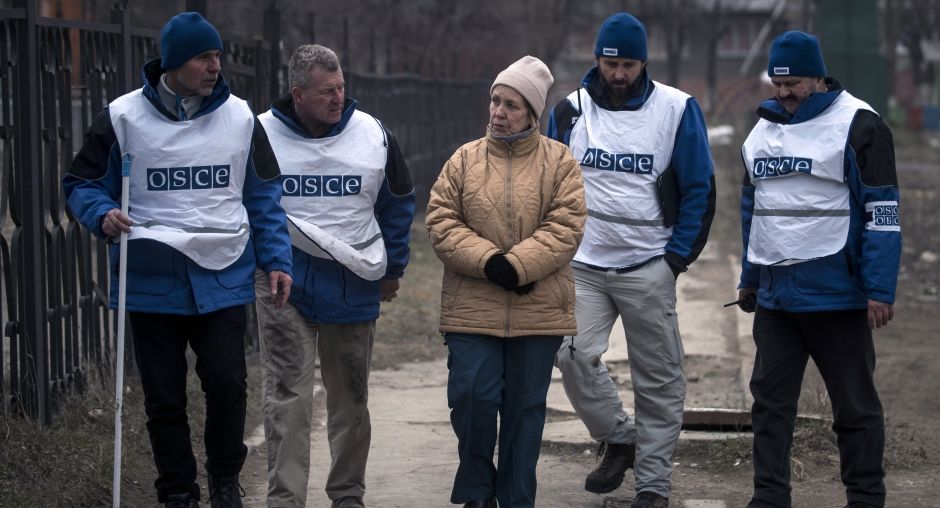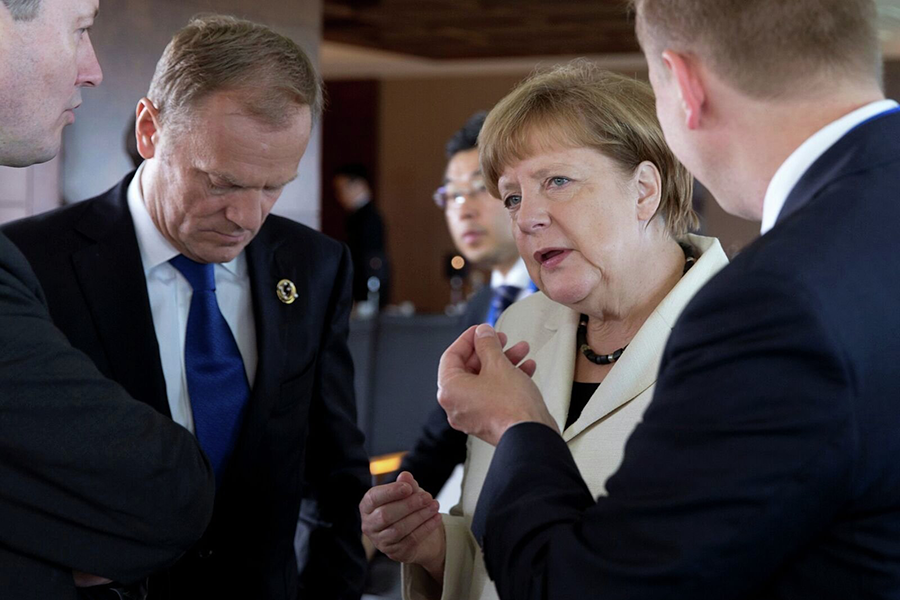Sir Robert Cooper from London School of Economics, has spent a week in the Donbas together with the monitoring group of the OSCE and has written a road map for resolving the conflict in Donbas. He believes that the implementation of Minsk-2 by Ukraine, even unilaterally, will help to resolve the conflict successfully. VoxUkraine publishes this article as part of a discussion on ways to solve the Donbas conflict.
Who am i and why am i writing this article
I have taken an interest in Ukraine from the time of the Orange Revolution, when I was working for Javier Solana. My advice to Ukrainians then was to make themselves irresistible to Europe. It is still my advice today, though it is a tough task. The EU’s interest is in well-governed, democratic neighbours. Ukraine is the most important of these. But only Ukrainians can make the political changes needed to achieve this.
I was outraged by the events of 2014, and wanted to contribute to a solution. I therefore accepted Wolfgang Ischinger’s invitation to lead the drafting team for the OSCE Panel of Eminent Persons’ report on European Security and the current crisis. In the course of this work I visited Ukraine several times. Most recently I spent a week with the OSCE Monitoring Mission in the Donbas. The reflections below arise from my observations there.
I first wrote this short note to put my thoughts in order following my week in South East Ukraine. I publish it now in the hope that it will stimulate thought in others. If that includes people close to policy making in Ukraine, so much the better. In the end everyone makes their own mind up; you can try to pressure people or governments, but conditionality or incentives work only when the policy makers believe in what they are doing. In the long run persuasion beats pressure; and the best way to persuade is to stimulate people but to let them reach their own conclusions.
I do know not how to get Russia out of Eastern Ukraine. We have not been good at understanding Russia. Nor is Russia good at admitting mistakes. So we should assume that success will need time. We should maintain incentives – economic and political sanctions – for the time when new factors create the conditions for a change.
In the long run the most important agent of change will be Ukraine itself. The more Ukraine becomes a just and democratic society with a strong economy, the more support for it will grow in the Donbas and separatist fantasies will die. Not a simple task, but it is the best guarantee of success. This all needs time. The ideas below are about how to use that time.

A strategy for Ukraine
Ukraine needs an active strategy for dealing with the conflict in the Donbas. Here are some suggestions:
Define the objectives:
- Keep the Donbas. It is no bargain, but redrawing borders only encourages people to ask for more. Without natural or ethnic frontiers it is better to stick to what history offers. In 1947 the West decided to divide Germany rather than to allow the Soviet Union to ruin a united Germany. This does not work so easily with Ukraine. There was an agreed territorial division in Germany; and Moscow conveniently sealed the East off. This does not look likely in the case of the Donbas.
In a just world Russia would pay reparations. In practice, if we are lucky, the West will pay some of the bill. This will be expensive, but it is cheaper than war.
- Keep Crimea too; but this needs a separate strategy, probably over a longer period. Violence in the Donbas makes it urgent. The Minsk Agreement, for all its faults, offers a way forward.
Define the means:
- The first two items below are objectives in their own right; but they are also means to rescue the Donbas. They will also both be contested by Russia.
- Peace in the Donbas is an end in itself, as well as a way to save it for Ukraine. It is the duty of the state to provide security for its citizens. The conflict in the Donbas was invented by Russia. When it failed in its original aim – to annex much of Russian speaking Ukraine and create a link to Crimea – Russia switched to using the conflict to weaken Ukraine, believing that this makes Russia strong. If Russia’s interest is conflict, Ukraine’s is peace. The more peaceful the environment, the more ridiculous and unsustainable Russia’s position becomes.
- Peace is what the people in the region want: they do not know what the war is about or why it is going on. They want to grow vegetables without fear of land mines; they want bus services to run. The government should be on the side of ordinary people trying to get on with their lives.
- Peace means less pressure for separation, less radicalisation, less Russian leverage; it counters Russian propaganda about the fascist takeover in Kyiv.
- It would also be an opportunity for the governments to restore the health and transport services that the LPR/DPR do not provide. No one is going to win a military victory. The aim is to win “hearts and minds”.
- The second important means is Western support. Ukraine needs Western political and economic engagement. Ukraine is not obviously a vital Western interest; so retaining Western goodwill matters. Russia will try to undermine this too.
- The third means is military. This is Russia’s strength; for Ukraine it is the weakest means. Military is for defence; peace is for victory.
Set the agenda:
A key question is how to approach the Minsk Agreement. This (sometimes called Minsk-2) is badly drafted and disorganised. It sets dates and deadlines for some of the actions it foresees – and none of these have been met – but not for all of them. The order is confused.
But until Minsk is replaced by something better it is the only agreed basis for a settlement. It figures in EU sanctions legislation. It remains a means of pursuing peace, of holding Russia to account and of securing Western support. The best approach for Ukraine is to interpret it reasonably and in a way consistent with its own interests. A logical sequence for Minsk would be as follows:
- Ceasefire – the first item in Minsk, the only one with a fixed date (already more than a year ago). This is indispensable for everything else. Most of the firing is pointless, doing no good to anyone. Why does it go on?
- Withdrawal of foreign forces – an obvious condition for elections. There is objective evidence of Russian forces; and Russia has admitted it. Foreign forces need to be far enough away that the population is not intimidated during the election.
- A period of calm and normality– plus other things like de-mining – will be needed before elections can be held. It should be easy to find donors to provide humanitarian aid and then economic rehabilitation. After initial costs peace is cheaper than war.
- Elections [1]: the Ukrainian government needs legitimate interlocutors. We do not know what local people want; in the fog of war they may not know themselves. Constitutional change is pointless unless it responds to local views. Foreign demands, whether from Russia or the West, are not legitimate.
- Elections should take place only when neutral observers can certify that the region has recovered enough for campaigning to take place. They should be internationally monitored.
- Then, if that is what people in the Donbas want, a debate on decentralisation is needed at the national level. There are many different ways to decentralise power; and constitutional change needs a national consent – Republika Serbska is a model no sane country would copy. If the people of the Donbas really want a veto on foreign policy, they should think of peaceful separation instead of federation [2].
- Return the border to Ukrainian control. Minsk does not say who is presently in control of the border. Russia presumable claims it is the separatists. In reality it their own forces.
Point 7 is placed last in the sequence because the Minsk Agreement states that restoration of control of the border to the Ukrainian government should begin on the first day of the local elections and should be completed following a political settlement, including constitutional reform. (Personally, I do not like this; but it is in the Agreement).

The Minsk Agreement is so unclear that it is possible to question whether it really constitutes an agreement – those who were negotiating it were doing so under the pressure of military events on the ground. But it remains the one piece of common ground. Pursuing it is still the right course for Ukraine:
- The order proposed is logical, within the imperfect terms of Minsk – indeed nothing else is defensible. It would show that the government was taking Minsk seriously.
- This means taking things step by step. In this way the difficult things come later.
- A ceasefire is in the interests of the government and the people in the Donbas. If we go no further, that alone would be positive.
- If we can get beyond this, so much the better; but Ukraine, and Western countries, should all insist, above all, that elections are held under acceptable conditions.
So go back to the start. Focus on the ceasefire. Without it the rest is nonsense.
A positive policy of working for a ceasefire might include:
- Take the JCCC seriously. Send good people to it with positive instructions. Insist that it operate in joint teams [3].
- Support OSCE efforts to separate the front lines – a proven way of reinforcing ceasefires. Work with the OSCE to develop other ideas.
- Follow up ceasefire violations – if this is done on the Ukrainian side it increases pressure on others to do the same.
- Propose local ceasefires. If the other side won’t respond, do them anyway on a temporary basis. Tell local people.
- Work with the OSCE on returning heavy weapons to storage – as required by Minsk. Set up joint monitoring of storage places.
- Work with the OSCE on marking and removing mines.
- Reduce roadblocks. The OSCE could create a programme for this too.
The rule for the Ukrainian Government should be to do what it can unilaterally; where reciprocity is desirable – eg on returning heavy weapons to storage – it should take the initiative and make the other side responsible for any failure. The ideas above are illustrations. Ukraine could work with the OSCE to develop more.
If necessary – and even when not strictly necessary – the Ukrainian side should be ready, in the context of the JCCC to do business with the representatives of the (so-called) LPR/DPR. This will not enhance their status but rather expose their lack of it. Officers seconded to the JCCC are not there to represent the Ukrainian government, but to pursue the ceasefire. (Nothing constitutes an act of recognition unless the government decides it is one).
By focussing on Minsk in this way the government:
- Does something useful for the unlucky people in the Donbas.
- Takes the moral high ground. It will be improving conditions for the people and implementing Minsk.
- Deflects pressure from difficult – and premature – things like constitutional change,
- Prepares for an election, and eventual reconciliation.
- Makes its position easier for its friends to support.
The important thing is a positive approach to Minsk, and to work with the OSCE – which will have practical ideas (better than those in this paper) on how to pursue the ceasefire. Above all the Ukrainian government should help the victims of Russian interventions, namely the people of the Donbas.
Commented by Carol Weaver, University of Leicester, UK
My task is to comment on the VoxUkraine article “The Formula of Reconciliation: How Minsk-2 may Help Resolve Ukrainian Donbas Problem” written by Robert Cooper, which outlines how the active conflict in East Ukraine can be ended by employing Minsk II in a particular step-by-step method. This is a good and important piece from someone so knowledgeable and experienced. Cooper wrote the suggested recommendations after visiting the Donbas and feeling compassion for those who are suffering. These people are mostly Ukrainian and the government has a responsibility towards them, including a responsibility to end the active conflict as soon as possible.
However, my response to the article is a critical piece which accepts that I have more questions than solutions. Although I write about peace in the Black Sea region, my solutions are regional and long-term. Given the current attitude from Russia’s leaders who have shown they cannot be trusted, any kind of short term solution might need to be gradual and win-win for all. If this does not happen then we are left with what I call ‘balanced multipolarity in action’ in the region (see my latest paper ‘Black Sea Regional Dynamics’, published by European Foreign Affairs Review in April 2016). Unfortunately Ukraine is currently one of the main battlegrounds for this ‘action’.
Here are my main comments on Cooper’s article:
The article says it is written in the main to “attempt to stimulate thought and debate”. Yes it does this. It also shows genuine concern for those who are suffering and goes into detail on a possible way of handling the situation. But might it also be seen as pressure on Ukraine from ‘the West’?
A Strategy for Ukraine: Keeping the Donbas would seem to be essential as Cooper suggests. Making Crimea a separate issue would also seem to be a necessity but cannot be regarded by the West as a fait accompli in exchange for a ‘frozen conflict’ in East Ukraine.
Define the means: “If Russia’s interest is conflict, Ukraine’s is peace.” So why would Russia accept peace without gaining everything they want?
Set the agenda:
- Many believe that Minsk is generally unworkable and the Ukraine government is suspicious of pressure from the West to implement it.
- Is the proposal just a recipe for yet another long term ‘frozen conflict’ and hotspot for organized crime? Better for the locals than hot conflict but, for example, Nagorno Karabakh has still not had the referendum on its status and there is no end to the dispute in sight.
- What will make Russia stop its interference in East Ukraine and elsewhere? Why will it support the ceasefire in reality? What does it want in return? These are probably the most important questions in order to achieve at least a partly win-win situation.
There would seem to be three possibilities with regard to implementing Minsk-2:
- Full package implementation (Russian option)
- Step-by-step implementation (Cooper’s option)
- Abandon it (unworkable option)
The step-by-step option could also be divided into different sequences.
Russia favours option 1. According to TASS, Lavrov has very recently stated that a step-by-step proposal is not acceptable and only a full package implementation will be supported by Russia. “It must be implemented fully, without any reservations, without any attempts to rewrite its logic and the sequence of actions.”
Cooper favours option 2 but the big problem is why would Russia agree to this without getting something in return? So what might this be?
- A change in Ukraine’s constitution so that Russia has greater influence?
- A reduction in sanctions?
- Crimea acknowledged as Russian?
- To regain an image of being a great country that can be trusted as a reliable actor in the modern world, rather than a corrupt Mafia state?
Others, as stated earlier, feel Minsk is unworkable. Ian Bond, in an interview with Hromadske, says, “the West is putting pressure on Ukraine, knowing that it has more leverage with Ukraine than with Russia.” Also Lough & Solonenko write something similar in a Chatham House paper.
So in conclusion, perhaps there is a possible way of obtaining peace quickly as outlined by Cooper but only by negotiating with Russia. These negotiations must create a win-win situation which means not giving in on constitutional changes or abandoning sanctions whilst Crimea remains in Russian hands. Nevertheless perhaps there could be step-by-step moves towards reducing some of the sanctions (those that most affect ordinary people) in parallel with the implementation of Minsk steps. Russia might also benefit from an improved image.
I hope that this very short comment has added to the reflections and debates.
- Dr Carol Weaver is a university lecturer and the author of many books and articles on the Black Sea Region. She has visited the area many times including Kyiv in March 2014.
Notes
[1] One of the clearer points of sequencing in Minsk is that “dialogue about the modalities of local elections” should begin the day after “withdrawal” ie the ceasefire, has taken place. Items 2 and 3 are logically part of those modalities.
[2] Decentralisation can mean many different things; but even fully federal countries do not give their states or provinces a veto on foreign policy or defence. (Does Chechnya have a veto in the Russian Federation?)
[3] The Joint Centre for Control and Co-ordination (JCCC) was set up in September 2014. Its HQ is in Soledar and it brings together staff officers of Ukraine and the Russian Federation; its mission has never been established with perfect clarity but it can be used to work for better implementation of the ceasefire.
Attention
The author doesn`t work for, consult to, own shares in or receive funding from any company or organization that would benefit from this article, and have no relevant affiliations



